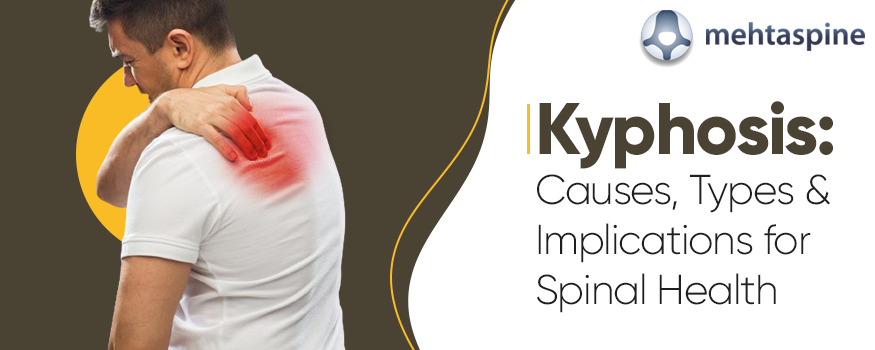Kyphosis: Causes, Types, and Implications for Spinal Health
Kyphosis is a spinal disorder characterized by an excessive outward curvature of the upper back, leading to a rounded or hunched posture. It is caused by several factors such as poor posture, degenerative diseases like osteoporosis, or inborn irregularities.
Kyphosis symptoms include middle back pain, difficulty maintaining a straight upper back, and an unusually rounded shape of the back. In severe cases, it can cause compression of the spinal nerves, resulting in neurogenic problems. Diagnosis typically involves physical examination, X-rays, or MRI scans.
Causes of Kyphosis
Kyphosis can result from different causes. The main contributing factor is poor posture, which tends to worsen due to habits like slouching. The second factor is overheavy backpacks. Diseases such as osteoporosis make the spine prone to permanent curvature and weaken the spine due to excessive stress from incorrect posture.
On the other hand, anomalies such as the deformation of vertebrae at birth open the door for kyphosis. Cancer or infections can also cause deformations in the spinal curvature. Disorders such as muscular dystrophy and cerebral palsy target the specific muscles of the back and gradually weaken them over time.
Types of Kyphosis
Kyphosis falls into several categories, determined by the typology of the cause. The anterior curve is the most common type of kyphosis, often referred to as postural kyphosis. It is usually a result of a back posture deformity. Scheuermann’s kyphosis is a condition in which the vertebrae skew more and more toward the head to form a protruding bend. It is associated with mid-teens and cannot be repaired by the body itself.
Birth kyphosis is caused by anomalies in the spine bones present in the body from the moment of birth. Kyphosis is brought about by osteoporosis and causes vertebral fractures, resulting in height changes.
Implications on Spinal Health
The health of the spine is vital and cannot be ignored. A healthy spine enables proper body positioning, and balanced body motion, and guards the spinal nerve. The eventual effect of poor spinal health can result in curvature abnormalities like kyphosis and scoliosis, leading to a range of health issues like pain, reduced mobility, and compression of the nerves. Daily lifestyle factors such as bad sitting and standing positions, physical inactivity, and excess weight are kyphosis causes.
Final Overview
In comparison, having good posture, frequent and intense physical activities, and a proper weight loss regime helps keep the spine healthy. Timely diagnosis along with adequate therapy helps avoid delayed consequences and maintain normal spinal operation.
Mehta Spine:Spine Surgeon in UK
Mehta Spine stands as the premier choice for spine surgery in UK. Mr. Mehta, a well-respected surgeon, is the driving force of the clinic, offering the community a high standard of skill and compassion. Visit the official Mr. Mehta Spine website to learn more!


